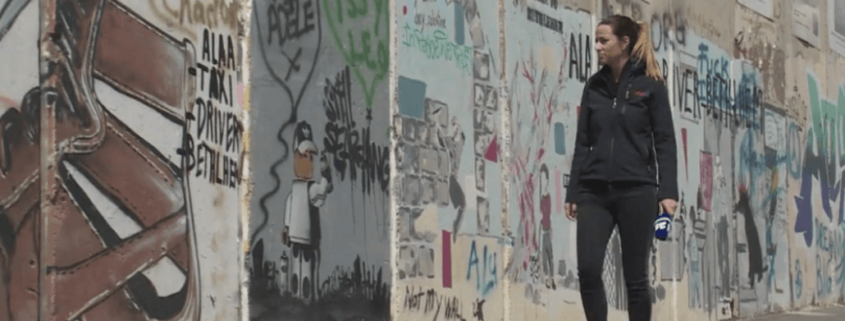“What do you know, girl? You were not even there.”
… and similar comments – and I will not even share the more vulgar ones, as they are not advertising-worthy.
Because I was. I was in Israel. And I have been to Palestine.
Did any of you get to choose where you were born? Do any of you know, but do you truly know, what it is like to grow up and live in a land where – at least according to the Bible – honey and milk are supposed to flow?
Neither do I. But I do know what I saw, heard and experienced as a journalist that week of April 2018.
I will start with a conversation with two gentlemen from the Jewish Quarter in Jerusalem. Azriel and Eyal explained to me (almost as if they were in agreement) identically that Palestinians and Jews coexist – and I quote – great.
“We have never lived better. We are Jews again, everything is perfect. We love each other, we build houses and roads together. They are our friends.”
Then came the ‘but’: “But, you know, there are evil people who want to kill other people.” Which, of course, is hard to disagree with.
Then came the second ‘but’: ‘But, a two-country scenario? Two nations? No, no, no. No. God gave us this land here! This is our gift from God!”
So much for coexisting well.
Have you ever heard of Hebron? The largest Palestinian city in the West Bank, but in fact a ghost town for a long time. Palestinians are forbidden to move around what were once the main, crowded streets. As a result, thousands have moved out of the old centre, while a few hundred Israeli settlers are guarded by young soldiers. So are we – the journalists and camera crews. At the same time, we were not allowed to record the statements of the admittedly few passers-by, but it was purely by chance that we stumbled upon a school excursion and the street became crowded up to the point where the army was no longer monitoring the situation so closely.
“This is Israel. Hebron is our city. It is absurd that Palestinians live here because it is ours. The soldiers have to protect us so that we can walk these streets, but this is our country. And the Palestinians want to kill us. They really do!” So you have read part of my conversation with the twelve-year-old. You read it right, a twelve-year-old.
Many of you have probably at least heard of Bethlehem. According to Christian belief, Jesus Christ was born there. It is an idyllic village, but one that does not at all fit the current image of the place.
“I am happy, but I really don’t like this wall here. You know why it is like this, do you not? The Israelis are shooting at us. Soldiers. They want to kill us.” You have read part of my conversation with the boy from Bethlehem. He is eight years old. Eight. A familiar expression, is it not?
These two children have – like none of us – been able to choose where they will be born. However, (some) adults did choose how they grew up.
One of the other people I spoke to described Palestine to me as a land so beautiful, yet completely hellish at the same time. Another explained succession in the true sense of the word: if you are born as a refugee, you shall remain one too.
My opinion on the Palestinian-Israeli conflict, now the Gaza war, has been the same all along. What is different from 2018 is simply that I am now in a position to warn, to call, to write, to speak, to criticise, to question, to pressure. I do what I can. I am in a minority, but that does not mean that I have been, am or will be silent. Quite the opposite.
Not only now, but throughout the whole mandate. With petitions. With resolutions. Amendments. Written questions to the competent authorities. By calling on the European Commission to respect fundamental rights and international law by drawing up a constitutional act in the context of the common commercial policy. Calls on the European Commission to take restrictive measures for violation of fundamental human rights (in connection with illegal settlements). Questions to the European Commission on the consideration of excluding Israel from EU-funded programmes. Calls on the European Commission to at least re-examine the implementation of the EU-Israel Association Agreement in the context of their non-compliance with international and humanitarian law. By publicly supporting the establishment of an international war crimes tribunal for children. By condemning Hamas. By taking a clear position on the need for an immediate ceasefire and sanctions in the face of the disproportionate retaliatory measures taken by the State of Israel in Gaza.
It is not normal that – in the name of security – one nation needs permission to exist, let alone survives. It is not normal that – in the name of security – you are controlled by soldiers who are barely of age for service.
It is not normal for a nation that was once emigrated and – I apologise for the term, but I will use it – ”wiped out” by others, to do the same.
Of course, terrorism is not normal. Nor is it normal to bomb indiscriminately. Leaving so many innocent dead. On whichever side. There is no justification for both.
It is not normal for someone to behave as if the whole world is theirs. And it is not normal that – in the name of security – this very world allows that to happen.
– Irena Joveva




Leave a Reply
Want to join the discussion?Feel free to contribute!